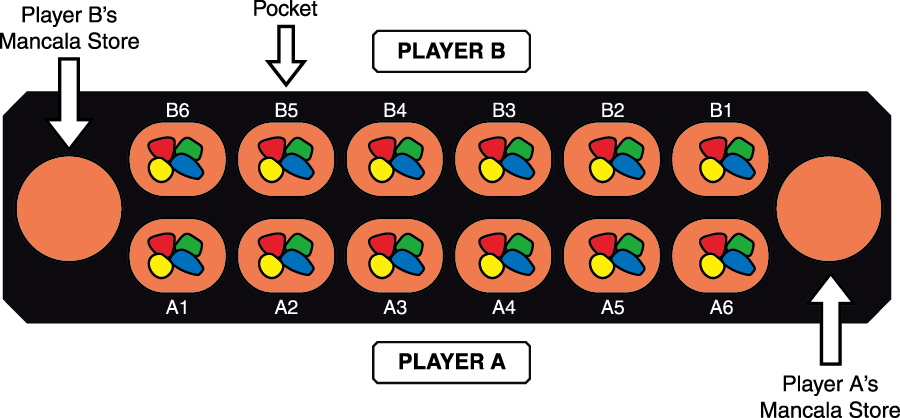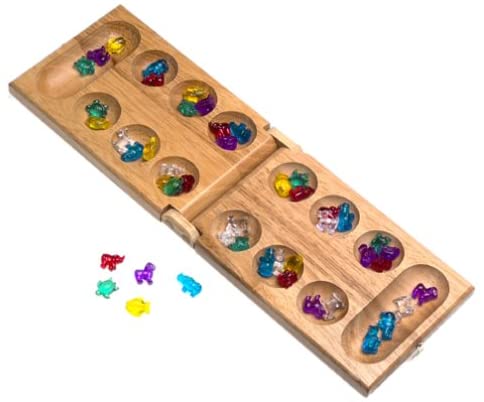

There are three cases of what to do depending on where the last pebble is dropped. For each slot visited, the player drops one pebble and stops until there are no pebbles left to drop.

To move, the player picks up all the pebbles in that slot and moves right one slot for each pebble. The player must choose one of the 6 slots on their side that has pebbles. The first player to start is randomly chosen. There are 48 pebbles total, and to start four pebbles are dropped into each of the twelve slots. The six slots closest to each player is theirs and each player's bowl is on the right. This is a 2-player game where each player has six slots and one bowl. There are 12 slots and 2 bowls on each board. So, the set of rules we chose allow for a fun experience against the AI. Here is an example of a MatLab script that will win in one turn if played first. By fairly, we mean that some variations of this game are not perfect and allow for an extremely calculated first move that is capable of ending the game. The particular rules we used allows for each AI to calculate a path to victory fairly. There are many variations of rules for Mancala since it is a very old game. The application should then be launched on a local server and can be viewed by a browser.įor more information about Flask you can visit: Mancala Rules Navigate to the Mancala-AI-Bot folder in your terminal and run the command:
MANCALA SETUP INSTALL
Sudo yum install python python-pip python-wheel Sudo apt-get install python python-pip python-wheel To launch this application make sure you are in a Python2.7 environment with Flask setup. The nighttime spirits of the ancestors would participate in this “electoral combat”, influencing their preferred candidate to win, giving their seal of approval to the new chief through the result of one or several games.A Mancala AI Bot implemented in Python using Flask. The Alladian and Baule peoples of Ivory Coast also used this game at night and behind closed doors to determine who would be the next chief. The players only play to entice and distract the soul of the deceased and any other lurking spirits. However, sometimes, people will take this risk for ritual purposes.ĭuring funerary wakes, mancala is played at night in Dahomey, for example. It is believed that an individual’s soul could be stolen, they could be cursed with sickness, their mother could die, if they were to play during the time the spirits are active. Anyone playing at night takes extreme risks in attracting malicious spirits and offending them with mortal play. At night mancala players leave their game boards and pieces outside for the spirits’ entertainment. When a Fon girl of Dahomey has her first menstrual cycle, she will seclude herself in her home for seven days as part of her initiation, which includes playing mancala. Women who want to give birth to twins will play against pairs of girls or boys. Playing with a girl will increase the odds of the baby being born female, playing against a boy will inversely make it more likely their baby will be male. It’s thought to have an influence on the sex of unborn children, so the Baule women of Ivory Coast play a special variant of the mancala game in hopes of influencing their child’s development. Mancala can also take on a more serious aspect. The Dogon of Mali do not encourage children to play mancala for fear that it will bring misfortune to the village, but adults playing the game seemingly don’t carry the same risk. For example, The Wolof of Senegal traditionally forbid non-initiated boys from playing. In certain areas, it is seen as a man’s game, and in others areas, men don’t play, making it a female game.Īlthough mancala games have educational value in teaching arithmetic skills, some places forbid boys or girls from playing. The rules of who is allowed to play vary from place to place.

The word Mancala is derived from the Arabic word Naqala (na-ka-la), which means “to move” or “to transfer” It is widely believed that Arab traders brought the game with them when traveling and it quickly spread all over Africa and the world, but it is uncertain to know where the game first originated. The board was carved out of limestone bearing a striking resemblance to modern-day Mancala boards. However, the oldest Mancala boards were found in An Ghazal, Jordan in the floor of a Neolithic dwelling. Ancient Mancala boards were found in Aksumite settlements in Matara, Eritrea, and Yeha, Ethiopia. There is archeological and historical evidence that dates Mancala back to the year 700 AD in East Africa.

Mancala is one of the oldest known two-player board games in the world, believed to have been created in ancient times.


 0 kommentar(er)
0 kommentar(er)
